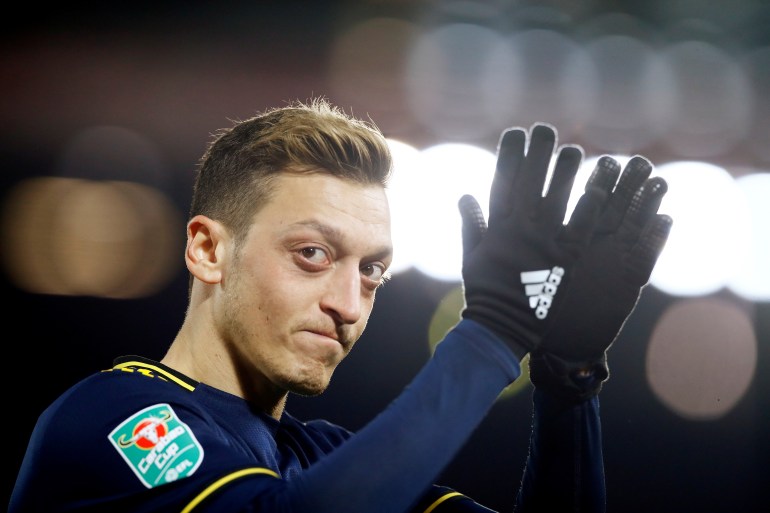Germany
Fans At The World Cup Illuminate Germany’s Racism Towards Former Teammate Mesut Ozil

Fans At The World Cup Illuminate Germany’s Racism:
Football supporters at the Qatar World Cup protested racism during the Spain vs. Germany match. The German team’s protest against the restriction on “One Love” armbands prompted these supporters to stage a visual protest outside the game. Fans held hand-drawn caricatures of Mesut Ozil, a former German footballer who was racially abused, and covered their lips throughout the match. This synchronized protest highlighted racism in sports, specifically Germany’s treatment of Ozil, who left the national team in 2018 following discrimination.
German-born Turkish midfielder Mesut Ozil was once considered one of the best of his age. In 2018, he unexpectedly retired from the German national team, alleging racism and disrespect. Ozil’s problems started when he and his teammate Ilkay Gundogan were criticized for posing with Erdogan before the 2018 World Cup.
Ozil’s exit shook the football world, sparking a closer look into players’ ethnic issues. He said, “I am German when we win, but I am a migrant when we lose.” He accused Germany’s football organization, supporters, and media of discriminating against Turkish people. Ozil called attention to racial remarks, hate mail, and German authorities’ inaction as abuse grew.
Ilkay Gundogan’s Call For Focus On Football Amidst Racial Controversy
Ilkay Gundogan, another Turkish player jeered by German fans, indicated a wish to move beyond the political turbulence after the Spain vs. Germany match. Gundogan stressed the importance of Qatar hosting the World Cup, the first Muslim nation to do so, despite Ozil and his racial issues. Gundogan’s message calls for unity and focuses on the game. Fans’ symbolic protest reminds us that football racism cannot be ignored. These issues become more critical to the sport’s narrative as the World Cup progresses.
Fifa’s “one Love” Armband Ban: An Unsettling Restriction
The supporters’ protest stems from FIFA’s contentious restriction on “One Love” armbands during the World Cup. The German team’s first protest over this suspension prompted a discussion on free speech and solidarity in the football community. Many see the prohibition as oppressive, yet it has accidentally become a focus point for sports discrimination concerns.
FIFA wants to be unbiased on political and social issues, but the “One Love” armband ban has highlighted racism. The supporters’ reaction, using Mesut Ozil as a symbol of racial injustice, complicates the sports, politics, and social justice debate.
Ozil’s Impact Beyond Football: A Catalyst For Change
Mesut Ozil’s choice to fight racism and leave the German national team has had far-reaching effects. The midfielder’s honesty has provoked discussions in sport and society. Ozil’s case inspires reform in how varied athletes are treated.
Racial prejudice affects athletes like Ozil, who was abused and had no instant help from German authorities. The supporters’ visual protest draws attention to a particular event and calls for a more inclusive and understanding football world. Ozil has pioneered societal transformation by defying expectations in sports.
Qatar World Cup: A Platform For Addressing Societal Issues
The World Cup in Qatar offers a unique opportunity to address social concerns in sports. Qatar is the first Muslim nation to host the event, symbolizing inclusiveness and battling preconceptions. Given this, the supporters’ protest during the Spain vs. Germany match highlights the need for a more nuanced discussion about race, identity, and representation in sports.
The Qatar World Cup allows football fans to debate social justice. Ilkay Gundogan’s demand to concentrate on football is acceptable, but the supporters’ protest insists on addressing racism. The event allows the worldwide football community to face and combat discrimination, encouraging solidarity and respect.
Read Also: German Churches Confront Racial Challenges Within Christian Communities
Global Impact Of Fan Activism
The supporters’ visual protest during the Spain vs. Germany match shows how fan involvement may change the worldwide discourse around football racism. In an era when fans are increasingly seen as potent change agents, this organized rally highlights supporters’ role in holding clubs and football governing bodies responsible for prejudice.
Fans may gather and voice their unhappiness with the present quo on social media. Covering their lips while showing Mesut Ozil photographs creates a visual tale transcending words. Fan action worldwide boosts attempts to end racial prejudice in the beautiful game.
Navigating The Complex Terrain Of Racism
FIFA and national football federations must negotiate racism in football as supporters raise their voices via symbolic gestures. The dispute over “One Love” armbands and Mesut Ozil’s experiences highlight these organizations’ struggles to combine neutrality and social problems.
Football’s governing bodies must promote inclusion and fight prejudice. This includes promoting diversity, educating players and spectators about the implications of discrimination, and taking prompt and firm action against racists. The demonstration reminds us that fans, players, and institutions must work together to end prejudice.
Beyond The World Cup: Sustaining The Conversation On Racism
While the Qatar World Cup sparks racist talks, the problem is to continue them. Fans’ symbolic protest and players like Mesut Ozil’s experiences highlight the need for ongoing football institutional change. These conversations must bring concrete changes to the sport after the World Cup.
Football’s capacity to unite people across cultures makes it a potent instrument. Football may help create a more inclusive and equal world by eliminating racism and injustice. The fans’ protest becomes a spark for continued conversation, encouraging stakeholders to be alert in the fight against racism in sports.













You must be logged in to post a comment Login